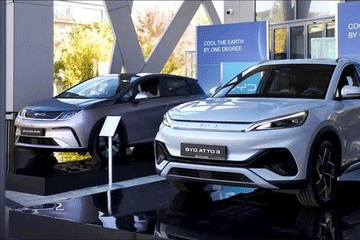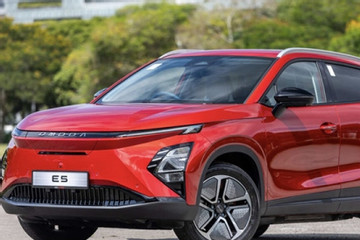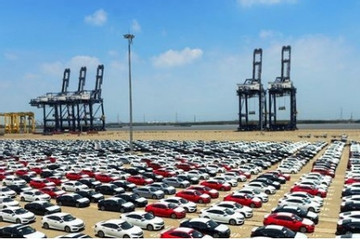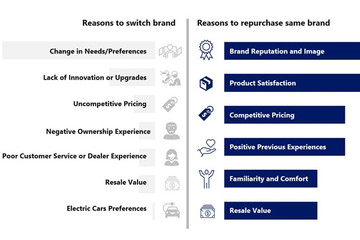- © Copyright of Vietnamnet Global.
- Tel: 024 3772 7988 Fax: (024) 37722734
- Email: evnn@vietnamnet.vn
vietnam's automobile market
Update news vietnam's automobile market
Chinese seek to expand in Vietnam's car market
Most of China's top 10 automobile manufacturers in Vietnam have ambitious business strategies.
Used cars unsold, awaiting push from market for new cars
Buying and selling in the used car market have been interrupted amid information about a possible government decision on vehicle registration tax cuts, commencing on August 1, applied to domestically assembled cars.
Domestic auto market expected to recover by year-end
Vietnam’s automobile market is expected to bounce back in the last months of 2024 if a proposal to cut registration fees by a half for domestically manufactured and assembled cars is approved.
10.5 million electric cars, 98 million electric motorbikes on roads by 2050
There are about 2.4 million cars in circulation and most of them run on gasoline, but by 2050 most vehicles will be electric, a report says.
Vietnam spends over US$1.5 billion on imported cars in first half of 2024
Despite a slowdown in the Vietnamese car market, the influx of foreign cars remains strong.
Used-car market lackluster amid news about lower vehicle registration tax
The news that the government may approve a 50 percent vehicle registration tax cut applied to brand new domestically-assembled cars has caused people to postpone their purchases until the cut goes into effect.
Used car market recovers, dealers pocket high profits
Sales of used cars have bounced back after a long period of slow growth. Many buyers have cancelled their plans to buy new cars and have bought used autos instead.
Significant progress for EV development in Vietnam
The development of electric vehicles in the Vietnamese market has shown significant progress in recent years.
Chinese electric cars face uphill battle in Vietnam's market
The Vietnamese market is witnessing a surge of Chinese electric cars since 2023, with five brands entering in just the past 12 months, covering all segments from mini cars to SUVs and MPVs.
Vietnam’s auto market warms up again as manufacturers slash prices
The domestic automobile market bounced back in May after a month of low sales as manufacturers cut selling prices amid weak demand.
Assembly cars lose ground in VN, await registration fee incentives
Vietnam witnesses a surge in imported cars, surpassing domestically assembled vehicles in recent months, prompting both consumers and manufacturers to anticipate forthcoming incentives.
Chinese cars flood Vietnam, but sales are poor
Chinese companies face great challenges selling their cars in Vietnam.
Which prices for Chinese cars are acceptable in Vietnam?
If Chinese cars sell at low prices, Vietnamese consumers dislike the products, but if the manufacturers sell at high prices, Vietnamese consumers prefer Japanese, European and South Korean brands.
Car prices rise due to exchange rates
To maintain profits, auto importers and distributors have to increase retail prices.
VN spends nearly $1b importing cars in the first four months of 2024
Vietnam imported 43,805 cars worth US$929.4 million in the first quarter, down 19.4 percent in volume and 23.5 per cent in value year on year
Will Chinese EV manufacturer be welcomed in Vietnam?
BYD, a Chinese electric vehicle (EV) manufacturer, plans to enter the Vietnamese market in June. Whether it will be welcomed in the country remains an unknown.
Mercedes cars' prices fall by VND700 million, but buyers say ‘too expensive’
The manufacturer has cut Mercedes cars’ suggested retail prices by VND210-719 million, and dealers have cut prices further.
Chinese automaker Chery to build US$800 million factory in Vietnam
Chinese automaker Chery's Omoda&Jaecoo and Vietnamese company Geleximco signed a joint venture agreement on April 4 in the northern province of Thai Binh to construct a US$800 million automobile plant.
Vietnam prefers cars imported from Indonesia
The number of imported completely-built units (CBU) during the opening two months of the year was estimated to be at 16,452 with a value of over US$345 million, with the majority of cars being imported from the Indonesian market.
An in-depth analysis of automobile buyers in Vietnam
A detailed analysis of automobile buyer behavior, conducted by ABeam Consulting Vietnam, has revealed insightful patterns and preferences that are shaping the Vietnamese automobile market.



















